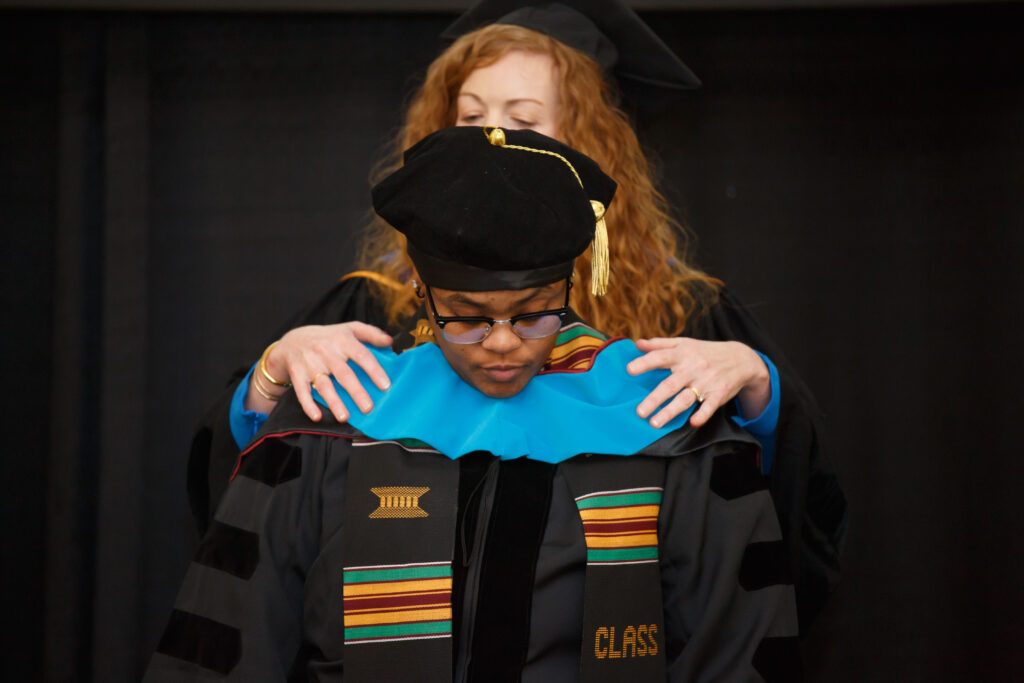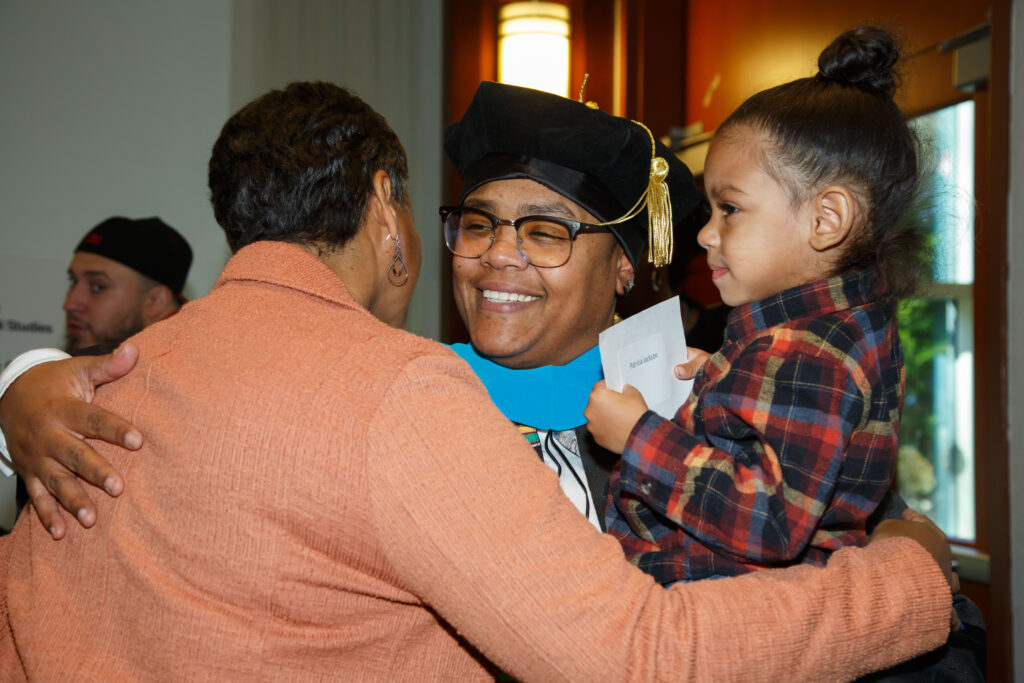Shelter is more than having a roof over your head. One woman’s journey from homelessness to the corner office.
Pat Jackson, graduated from the Doctor of Law and Policy (DLP) program in 2022 and is now the Executive Director of Habitat for Humanity of Greater Providence and East Bay, a nonprofit organization that provides housing support services to over 175k people.

Prior to this, Jackson was the Interim Executive Director for Brockton Development authority, a quasi-public agency in Massachusetts focused on the economic revitalization and community development for the city residents, a population of more than 100,000.
In Rhode Island, along with major city power brokers and elected officials, Jackson helps make decisions about commercial and residential real estate investments. She also advocates for people who are experiencing homelessness and develops programs to benefit low- and moderate-income households.
Her dedication to serving others and her commitment to those who are experiencing homelessness is more than a job. It’s personal.
The Difficult Journey
When Jackson was eight years old, she and her family experienced homelessness. They lived in their car and in shelters where it was mandatory to check in every evening and check out the next morning. Her father suffered from a substance use disorder, making it difficult for her mother to afford rent on her own and meet the needs of their six children.
That cycle of uncertain housing and insecurity ended when Jackon’s mother got a job at one of the best places to work at the time in Kansas City, Kansas—the Proctor and Gamble factory.
Education and Academic Credentials
When Jackson became an adult, she moved to Parkville Missouri, a fifteen-minute journey from her birthplace in Kansas City. She received her bachelor’s degree in public administration from Park University, a small local college that identifies social responsibility as one of its core values. After graduation from Park University, Jackson worked at Tyson Foods.
On a whim in 2015, she took a vacation trip to Boston and as she ended an enjoyable duck boat tour with friends, the duck boat stopped downtown. Jackson alighted and went to a Dunkin Donuts to grab a drink. After purchasing a coffee, on her way out of the store, she said, “That’s when my life changed.”
As she left the Dunkin Donuts store, Jackson bumped into someone, spilling her coffee all over the other woman’s shirt. She apologized and gave the woman, named Sasha, her phone number with a promise to buy her a new shirt. Sasha called while Jackson was still in Boston, and they had ‘a couple more dates’. Jackson says, “I did buy her that new shirt!”
After Jackson returned home, she stayed in close contact with Sasha. They began a long distant relationship and in 2016, Jackson quit her job at Tyson’s and moved to Boston.
Jackson didn’t know anything about Northeastern or CPS before she applied. But she always knew that she wanted to continue her education and get her master’s degree; she was just waiting for the opportunity. Sasha, who grew up in Roxbury right next to the Northeastern campus, told her about Northeastern’s legal studies program. Jackson applied, got accepted, and concentrated on a Business Law degree. She then went on to become a Double Husky, obtaining her doctorate in 2022.
It was an amazing onboarding experience,” Jackson said. The advisor said ‘hey, we have a Law program and I think you’d be a great fit’ and I applied and got in and the professors were so supportive. Advisors really can shape your life!”

Jackson liked the fact that the Doctor of Law and Policy program was aimed at experienced professionals seeking to effect change through a deeper understanding of the origins, development, implementation and analysis of legal and public policy decisions.
Jackson identified three classes in the program that helped her the most in her current role:
- The Law and Legal Reasoning course gave her a more in-depth look at how the courts operate, and their impact on policy making and implementation.
- Dr. Theodore Johnson’s Historical Foundations of American Law class forced her to think outside the box on the creation of law and policy, and Johnson was the second reader on her dissertation.
- And, the Public Policy Theory and Practice course that included the former Massachusetts Speaker of the House, Robert DeLeo, Northeastern University Fellow for Public Life, and a member of the College of Professional Studies left a particularly indelible mark.
“The way [DeLeo] talks about tackling some of the tougher policies and the need for both sides of the aisle to work together for a more common and purposeful goal was inspiring.”
Pat Jackson
Since graduating with her PhD, Jackson is particularly intentional about applying the learnings from her courses and fellow classmates. Today, she is a champion for challenging the assumptions of what it means to experience homelessness.
Mentors and Cohorts

“The assumption that ‘once you’re housed, the problems will go away’ is false. Take a young woman, named Jane, who is homeless with a drug addiction. If you give her a home, it doesn’t mean her drug addiction will go away. I believe there should be something to help her with her addiction so she can stay in her housing. We talk about how many people we house but we don’t talk about recidivism, how many times the same person comes back through the system. Housing services demand additional wrap-around services, and that’s what I advocate for, because I’m looking for real results.”
In Massachusetts, the current model is a ‘Housing First’ philosophy. Jackson thinks this can be improved but she also sees that it’s making a positive impact.
“The housing system is similar to the penal system,” she said, “if we keep seeing people coming back, we should be focusing on what we need to do to prevent them from coming back again.”
Jackson also recognizes the importance of having a mentor and an advocate to help identify jobs, transportation options, substance use disorders and mental health programs when needed.
On the advocacy front, Jackson is currently working with several legislators to advance opportunities in the state to make progress. She has also teamed up with several local activists to visit the state house and talk about affordable home ownership and changes to the landscape of neighborhood design,
“I’m all about building the neighborhood to establish the village,” she said.
Advice for Prospective Law and Policy Students
Asked what advice she might impart to prospective students, Jackson said:
“The spectrum for what you can do with this degree is so wide. This program helps shape the way that you look at work from a macro level. It enables you to be an advocate and dig deep to find out what you are willing to fight for and where you are willing to advocate for change.”
Pat Jackson
As for what higher education institutions like CPS and Northeastern can do for housing advocacy, Jackson has thoughts on that, too.

In our program curriculum, it’s important to start these conversations earlier. For me, we didn’t start this conversation until my senior year. So, it’s the institution taking proactive steps towards inclusivity, making sure they include the people who reside in these neighborhoods in the planning of the curricula and identifying the real-world issues around every topic. And giving that a platform in the classroom.
She said that individuals who are keen to become active beyond the classroom can consider joining the boards of local Community Development Committees (CDCs), join the local NAACP or action firms that have housing and legislative meetings, attend public meetings, and make sure they stay informed.
She says, “Go to ‘advocacy day’ at the state house and speak out against things. Don’t let issues like this die.”